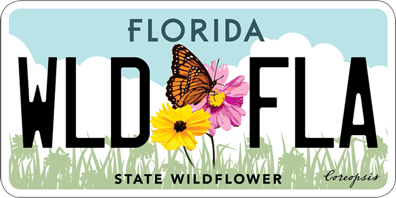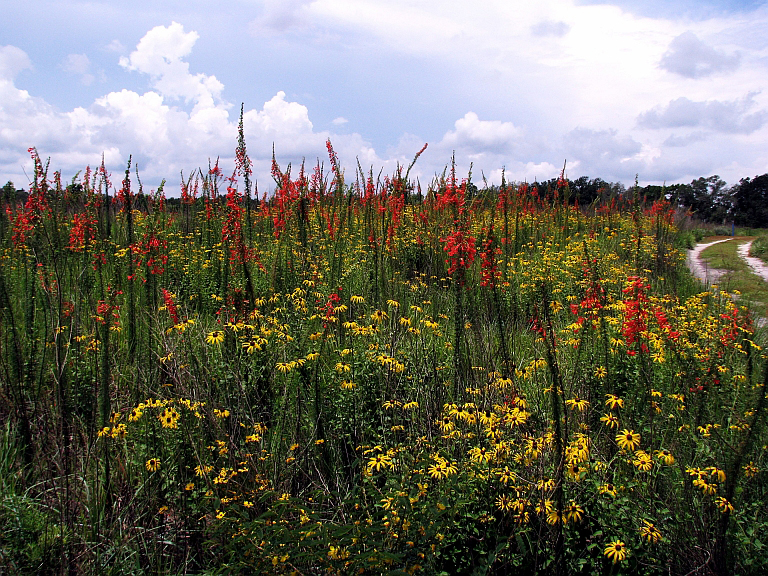PEAR Park project to test weed control methods
Pictured above: Standing cypress (Ipomopsis rubra) and Softhair coneflower (Rudbeckia mollis) along the Meadow Trail at PEAR Park in Lake County. Photo by Peg Urban
As anyone who has started a small wildflower meadow at home probably knows, weeds can make or break successful wildflower establishment. Oftentimes, weed seeds germinate and plants grow so aggressively that they can outcompete wildflower seedlings. That’s especially true of large-scale roadside projects and natural land restorations.
Unfortunately, little scientific information exists on effective weed control during wildflower establishment in large areas. That’s why the Florida Wildflower Foundation has joined with Lake County on a research project at PEAR Park in Tavares that will experiment with various weed control methods.
“This is an exciting step for the Foundation, which has only supported research in the past with grants,” said Brightman Logan, the Foundation’s research chairman. “This project gives us the chance to steer our own project to test methods we hope will boost the success of restoration efforts and roadside plantings.”
The project, tentatively titled “Strategies for Establishing Sustainable Plantings of Native Herbaceous Species” is in its planning phase, with an anticipated launch in fall 2018 if funding can be secured. It likely will feature several methods, including the traditional herbiciding followed by mowing; over-seeding or “super-seeding,” in which an abundance of wildflower seed is planted; as well as deep soil inversion, which buries weed seeds so deeply they can’t germinate.
Citizen scientist volunteers will lend a hand, making observations every four to eight weeks to compare the percent coverage of weeds and wildflowers, as well as to note weed species.
The project is expected to last between three and five years. It is funded by the State Wildflower license plate and Florida Power & Light (NextEra Energy Foundation), with Lake County contributing in-kind.
“The Florida Wildflower Foundation has a long history of partnership with Lake County, and we are thrilled to be working with county staff and volunteers on this project,” said Lisa Roberts, the Foundation’s executive director.
PEAR Park, off U.S. Highway 27, is a former University of Florida-IFAS research station where several large restorations have already occurred. In 2007, the Foundation provided funds for a 2-acre wildflower meadow restoration (above) adjacent to a 50-acre scrub habitat restoration. Lake County received another Foundation grant in 2013 for the establishment of a native landscape adjoining a new wildlife-viewing blind.

